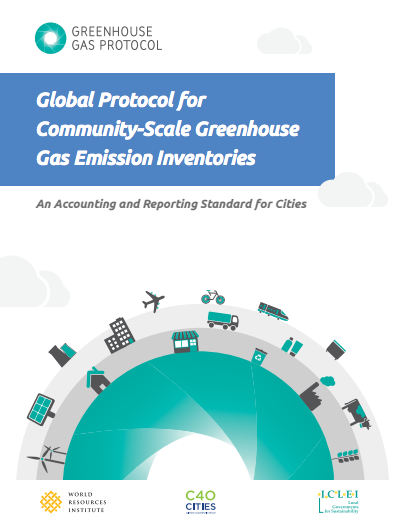Responsible for more than 70 percent of global energy-related carbon dioxide emissions, cities represent the single greatest opportunity for tackling climate change. The first step for cities to realize their potential is to identify and measure where their emissions come from — you can’t cut what you don’t count.
GHG Protocol is working to give cities the standards and tools they need to measure their emissions, build more effective emissions reduction strategies, set measurable and more ambitious emission reduction goals, and to track their progress more accurately and comprehensively.
World Resources Institute, C40 Cities Climate Leadership Group and ICLEI – Local Governments for Sustainability (ICLEI) have partnered to create a GHG Protocol standard for cities that known as Global Protocol for Community-Scale Greenhouse Gas Emission Inventories (GPC).
Download the full GPC Standard
Download the Executive Summary of the GPC.
Download the GPC Infographic.
Read the WRI Insights blog on the launch of the GPC: Hundreds of Cities Poised to Replicate Rio’s Approach to Measuring and Reducing Emissions.
The GPC provides a robust framework for accounting and reporting city-wide greenhouse gas emissions. It seeks to:
- Help cities develop a comprehensive and robust greenhouse gas inventory in order to support climate action planning
- Help cities establish a base year emissions inventory, set reduction targets, and track their performance
- Ensure consistent and transparent measurement and reporting of greenhouse gas emissions between cities, following internationally recognized greenhouse gas accounting and reporting principles
- Enable city inventories to be aggregated at subnational and national levels
- Demonstrate the important role that cities play in tackling climate change, and facilitate insight through benchmarking – and aggregation – of comparable data
The GPC is the newest and full publication that has taken into consideration feedback from the pilot test in 2013 and global public comments in 2012 and 2014 (get more information about the GPC development process). It replaces all the previous draft versions of the GPC and supersedes the International Local Government Greenhouse Gas Emissions Analysis Protocol (community section) published by ICLEI in 2009 and the International Standard for Determining Greenhouse Gas Emissions for Cities that published by the World Bank, United Nations Environment Programme (UNEP), and UN-HABITAT in 2010.
A globally-recognized standard
To date, more than 100 cities across the globe have used the GPC (current and previous versions) to measure their greenhouse gas emissions:
The development of the GPC is guided by an advisory committee that includes representatives from world leading organizations on sustainable development as well as national governments and cities that have vast experience in low carbon city development:
- Junichi Fujino, IGES/NIES
- Kiyoto Tanabe, IPCC
- Kyra Appleby, CDP
- Maria Varbeva-Daley, BSI
- Matthew Lynch, WBCSD
- Michael Steinhoff, ICLEI US
- Ragnhild Hammer, Arendal London
- Sergey Kononov, UNFCCC
- Shirley Rodrigues, CIFF
- Stefan Denig, Siemens
- Victor Hugo Paramo, Mexico City
- Yoshiaki Ichikawa, ISO
- Yuuko Nishida, Tokyo
- Pankaj Bhatia (chair), WRI/GHGP
- Seth Schultz, C40
- Yunus Arikan, ICLEI
- Stephen Hammer, World Bank
- Robert Kehew, UN-HABITAT
- Soraya Smaoun, UNEP
- Adam Szolyak, Covenant of Mayors
- Alvin Meijia, Clean Air Asia
- Amanda Eichel, Bloomberg Philanthropies
- Carina Borgström-Hansson, WWF
- Farhan Helmi, Indonesia (NCCC)
- Ines Lockhart, Buenos Aires
- Jan Corfee-Morlot, OECD
- Jean-Pierre Tabet, France (ADEME)
The GPC has been adopted by the following programs and initiatives:
- The Compact of Mayors is an agreement led by city networks to undertake a transparent and supportive approach to reduce city emissions and enhance resilience to climate change. It is expected that about 500 cities will join the Compact by the end of 2015. To do so, cities are required to measure and report greenhouse gas emissions using the GPC.
- carbonn Climate Registry is the common, publically available repository for the Compact of Mayors. It provides standard reporting templates to help cities report their GHG emissions using the GPC. Currently about 300 cities have reported their emissions using carbonn Climate Registry.
- CDP runs the world’s largest environmental reporting platform. More than 5,000 companies, 200 cities, and 12 states and regions use CDP’s platform every year to report on their environment-related data, including GHG emissions, climate risks, water risks, and economic opportunities. CDP serves as the official reporting platform for C40 cities, the Compact of Mayors and the Compact of States and Regions. CDP supports cities in reporting their emissions using the GPC.
- PAS 2070, which is a specification developed by the British Standards Institution that sets out requirements for the assessment of urban greenhouse gas emissions. One of the greenhouse gas accounting methodologies (‘direct plus supply chain’ methodology) laid out in PAS 2070 was based on the GPC.
- ISO37120 provides a set of indices to guide cities as they chronicle their sustainability performance. As part of the climate change indicators, cities are required to measure their GHG emissions using the GPC.
- World Bank’s Low Carbon, Livable Cities Initiative is in the process of developing its ‘city climate planner’ certification program. As part of this program, World Bank will provide training and certification on city-wide GHG inventories based on the GPC.
- Inter-America Development Bank’s Emerging and Sustainable Cities Initiative (ESCI) supports small and medium size emerging cities in Latin America and the Caribbean pursue low carbon development. Over the last two years, ESCI has applied the GPC to more than 10 cities in the region.
Partners
Authors:



Endorsing Partners:



Acknowledgement
The GPC development process was generously supported by The Caterpillar Foundation, The Stephen M. Ross Foundation, UN-Habitat, United Technologies Corporation, C40 Cities Climate Leadership Group, ICLEI – Local Governments for Sustainability, and the Urban-LEDS project. (more details about the funders)
Slides from the GPC Launch
Photos from the GPC Launch
Supporting Tools, Guidance, and Publications
Complementing the GPC, we are developing calculation tools and country-specific guidance, and conducting research to help cities and stakeholders apply the GPC.
Greenhouse Gas Accounting Tool for Chinese Cities
The Greenhouse Gas Accounting Tool for Chinese Cities consists of an Excel calculation tool and its guidance document that was developed based on the GPC and designed specifically for application in China. It was developed in partnership with the Institute of Urban and Environmental Studies of the Chinese Academy of Social Sciences (CASS), WWF China, and Institute for Sustainable Communities (ISC). A brochure that provides an overview of the tool and guidance in available here: English / Chinese .
Global Protocol for Cities in the News
Business Green: Cities Launch Yardstick to Measure Greenhouse Gas Emissions
Click Green: First Global Standard Launched to Measure Cities’ Greenhouse Gas Emission
Governing: A Better Way for Cities to Measure Greenhouse Gases
National Geographic: First Global Standard Launched to Measure City Greenhouse Gas Emissions & Support Compact of Mayors
Science: Giving Cities a Road Map to Reducing Their Carbon Footprint
Sustainable Business: World’s Cities Announce Concrete Action at Climate Summit
Times of India: Rajkot one of 40 global cities to cut carbon emissions
Zayed Future Energy Prize: World Resources Institute Rolling Out Finalized Tool For Cities To Tackle Climate Change
Contact Us
For more information, please contact Dr. Wee Kean Fong, wfong@wri.org


